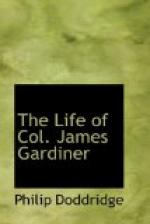on it denoted the union between Christ and his Church,
implying, that as the grapes derived all their beauty
and flavour from the vine, so the saints, even in
a state of glory, were indebted for their establishment
in holiness and happiness, to their union with their
common Head, in whom they are all complete. While
they were conversing, he heard a tap at the door,
and was informed by the angel that it was a signal
of his Lord’s approach, and was intended to
prepare him for an interview. Accordingly, in
a short time our Saviour entered the room, and upon
his casting himself at his feet, he graciously raised
him up, and with a smile of inexpressible complacency,
assured him of his favour, and kind acceptance of
his faithful services, and as a token of his peculiar
regard, and the intimate friendship with which he
intended to honour him, he took the cup, and after
drinking of it himself, gave it into the Doctor’s
hand. The Doctor would have declined it at first,
as too great an honour; but our Lord replied, as to
Peter in washing his feet, “If thou drinkest
not with me, thou hast no part with me.”
This he observed filled him with such a transport
of gratitude, love and admiration, that he was ready
to sink under it. His master seemed sensible
of this, and told him he must leave him for the present,
but would not be long before he repeated his visit.
As soon as our Lord was retired, and the Doctor’s
mind more composed, he observed that the room was
hung with pictures, and upon examining them, he found
to his great surprise, that they contained all the
history of his life; and most remarkable scenes he
had passed through, being there represented in a very
lively manner—the many temptations and
trials he had been exposed to, and the signal instances
of the divine goodness in the different periods of
his life. It may not be easily imagined how this
would strike and affect his mind. It excited
in him the strongest emotions of gratitude, especially
when he reflected that he was now out of the reach
of any future danger, and that all the purposes of
divine love towards him were so amply accomplished.
The exstacy of joy and gratitude, into which these
reflections threw him, was so great that he awoke;
but for some time after he awoke the impression continued
so lively that tears of joy flowed down his cheeks,
and he said that he never, on any occasion, remembered
to have had sentiments of devotion and love equal
to it.
APPENDIX II.
(Referred to in Chapter VII, DOMESTIC RELATIONS.)
The following extract from Dr. Doddridge’s “Thoughts on Sacramental Occasions,” gives a beautiful and edifying picture of the exercises of his affectionate and pious heart under a painful bereavement.
THE SEVENTY-EIGHTH SACRAMENT, OCTOBER 3, 1736.
DEAR BETSEY DEAD.[1]




